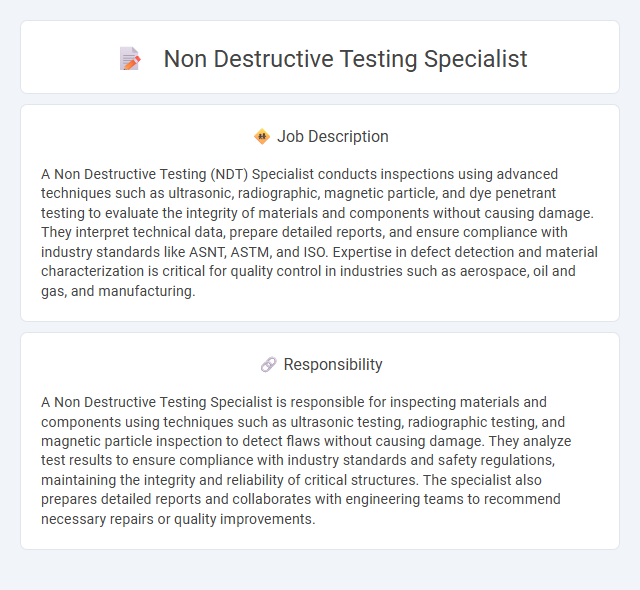
A Non Destructive Testing (NDT) Specialist conducts inspections using advanced techniques such as ultrasonic, radiographic, magnetic particle, and dye penetrant testing to evaluate the integrity of materials and components without causing damage. They interpret technical data, prepare detailed reports, and ensure compliance with industry standards like ASNT, ASTM, and ISO. Expertise in defect detection and material characterization is critical for quality control in industries such as aerospace, oil and gas, and manufacturing.
Individuals with strong analytical skills and attention to detail are likely suitable for a Non Destructive Testing Specialist role, as it requires careful examination of materials and structures without causing damage. Candidates who are comfortable working in industrial environments and possess a methodical mindset may adapt well to the precision and safety standards demanded by this job. However, those who struggle with repetitive tasks or high responsibility for safety might find this role challenging.
Qualification
A Non Destructive Testing (NDT) Specialist requires certifications such as ASNT Level II or III in methods like Ultrasonic Testing (UT), Magnetic Particle Testing (MT), and Radiographic Testing (RT). Expertise in interpreting test data and adherence to industry standards such as ASTM, ISO, and API ensure accurate flaw detection without damaging materials. Strong knowledge of metallurgy, safety protocols, and experience with advanced NDT equipment enhance inspection quality in sectors like aerospace, oil and gas, and manufacturing.
Responsibility
A Non Destructive Testing Specialist is responsible for inspecting materials and components using techniques such as ultrasonic testing, radiographic testing, and magnetic particle inspection to detect flaws without causing damage. They analyze test results to ensure compliance with industry standards and safety regulations, maintaining the integrity and reliability of critical structures. The specialist also prepares detailed reports and collaborates with engineering teams to recommend necessary repairs or quality improvements.
Benefit
Non Destructive Testing Specialists likely benefit from enhanced career stability due to the high demand for their expertise in quality assurance across various industries. They may experience professional growth opportunities as technological advancements in testing equipment continue to evolve. The role probably offers financial rewards and job satisfaction linked to ensuring safety and reliability in critical infrastructure.
Challenge
Non Destructive Testing Specialists likely face complex challenges in accurately detecting material flaws without causing damage, requiring precision and advanced technical knowledge. The evolving nature of testing technologies may demand continuous learning and adaptation to maintain high standards of safety and quality. Problem-solving under pressure and interpreting subtle data signals are probable key aspects of this demanding role.
Career Advancement
Non Destructive Testing (NDT) Specialists play a crucial role in ensuring the integrity and safety of materials and structures across industries such as aerospace, oil and gas, and manufacturing. Career advancement opportunities typically include progressing to senior technician roles, NDT inspection management, or specialized certification in advanced techniques like ultrasonic testing or radiographic analysis. Continuous professional development and acquiring industry-recognized certifications from organizations such as ASNT or PCN significantly enhance promotion prospects and salary growth.
 kuljobs.com
kuljobs.com